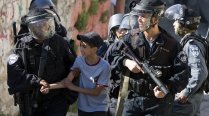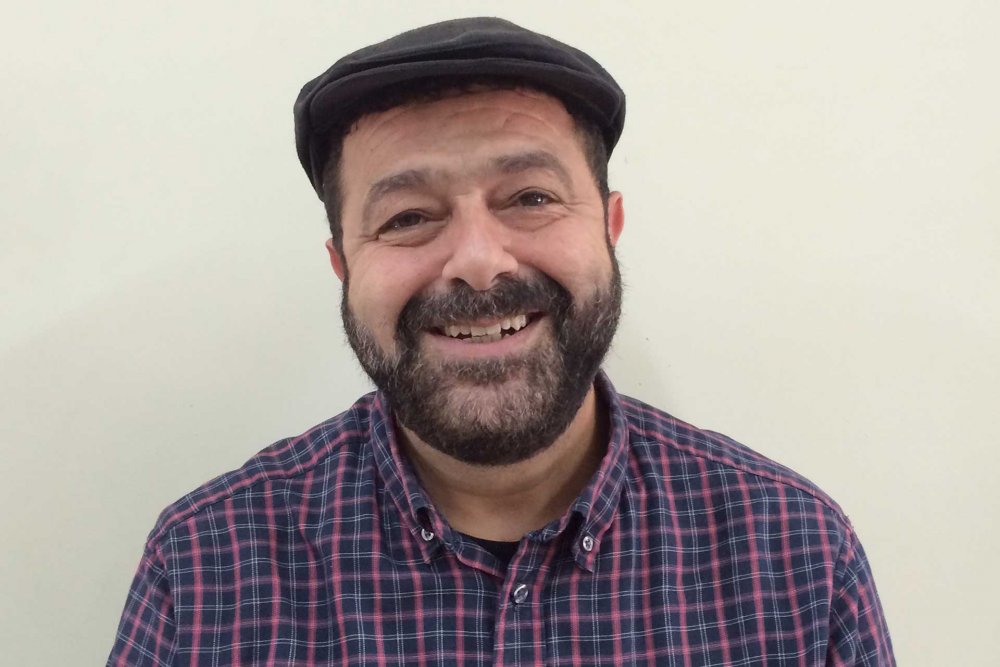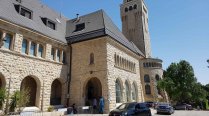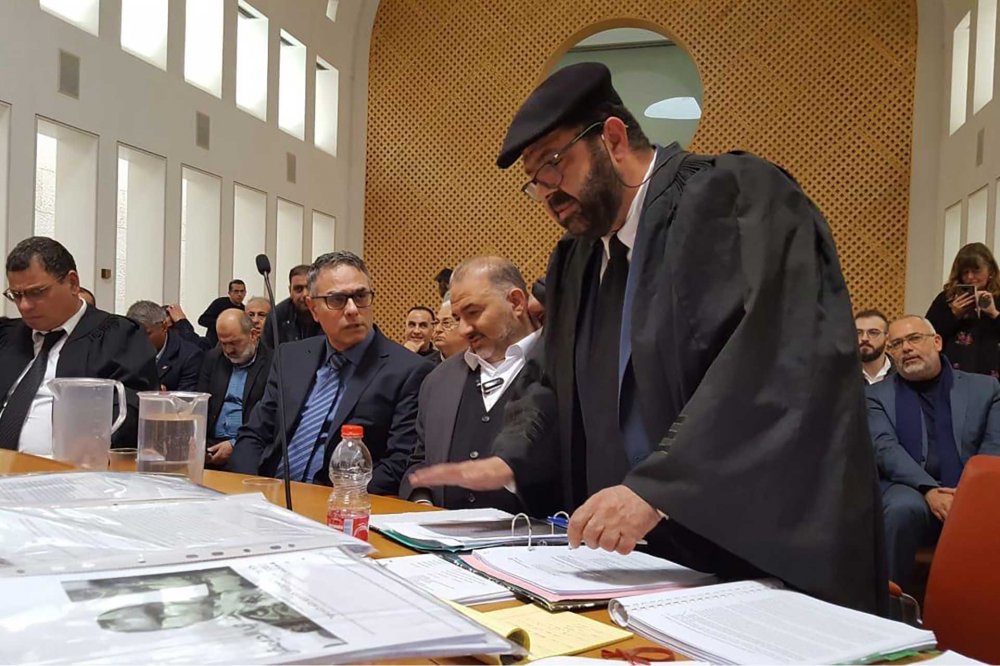Introduction/Overview

Credit:
Collège des Frères Facebook page
Hassan Jabareen: “If You Succeeded in Closing UNRWA, Why Not Continue and Close Schools and Fire Teachers?”
Snapshot
A legal expert perspective on Israel’s new education law, which Palestinians say is a weapon aimed directly at their collective identity and their national claim to Jerusalem as their capital city.
Israel’s new education law, passed by the Knesset on November 4, 2024, empowers the director general of the Ministry of Education to fire teachers who “publicly identify with a terrorist organization or act of terrorism and/or support them” based on the administration’s assessment of their alleged support and sympathy for “terror organizations and acts.” It also authorizes the minister of education to revoke funding for schools if the minister believes that “expressions of solidarity with an act of terrorism or with a terrorist organization, or support for them, exist within the institution, and that the management of the school knew or should have known of their existence.”1
Both debate in the Knesset about this bill as well as Explanatory Notes attached to it stress that Palestinians of East Jerusalem and their institutions are the primary intended target of the bill.2
To learn more about the new bill and explore its potential ramifications, on November 14, 2024, we spoke with Palestinian advocate Hassan Jabareen.
Jerusalem Story (JS): Thank you so much for joining us today. Can you please briefly introduce yourself?
Hassan Jabareen (HJ): I am Hassan Jabareen. I am the general director of Adalah–The Legal Center for Palestinian Rights in Israel. I am an attorney and PhD in law.
JS: So we’re here today to discuss the new law that was just passed by the Israeli Knesset. It’s called the Bill for Prohibition on Employment of Teaching Personnel and Withholding Budget from Educational Institutions due to Identification with Act of Terrorism or Terrorist Organization. That’s a mouthful. Can you help us unpack this bill? First off, what are its provisions?
HJ: This law is part of all the emergency laws that Israel used against the Palestinians inside Israel and Jerusalem during this war. The right wing is using this war to incorporate in many, many laws the terms “act,” “terror act,” “supporting terror,” “sympathize with terror” in order to limit the political rights of the Palestinians. And now, not just political rights, but also social rights, because we are speaking about education rights.
This law says that the Ministry of Education has the authority to fire any teacher if this teacher supported or sympathized with terror or supported a terror act. That means there is no need to criminalize him. It’s enough that the ministry thinks that what he said falls within the definition of “supporting terror” based on their considerations in order to fire him. For example, if teachers say, “We support the Palestinians in Gaza,” or “we sympathize with the suffering of the people in Gaza,” the ministry—because we are speaking about a right-wing ministry and an extremely racist ministry—they might find that supporting the people in Gaza during the war is supporting the enemy. And since the enemy is Hamas, so this is supporting a terror organization.
The other thing about this law is that it authorizes the ministry to close a school if this school supports terror; if the students support terror; or if this school enables the possibility or opens the possibility of supporting terror. What does that mean? If the students have a demonstration in the school for supporting Gaza, collecting donations for the people in Gaza, collecting clothes for the kids of Gaza, they might find themselves—this school might be closed by the ministry, because it will be perceived as enabling—as giving the possibility or opening the possibility to support terror, terror acts, or terror organizations.
How will the narrative be built? The same [way] as [with] teachers: Supporting the people in Gaza during the war is supporting our enemy. Our enemy is Hamas, and thus Hamas will benefit from that. And maybe those donations will go to Hamas, indirectly or directly. And thus, your act is supporting terror.
So why this law? Legally, there is no need for this law. Because there is a criminal law. The criminal law says if any person supports terror acts or supports a terror organization, the police can indict him, the state can indict him, and you have a criminal procedure.
But this law came beyond the criminality and authorized the administration to take action against the teachers and take collective punishments against the school itself.
Now, if you want to compare this law with the logic of the UNRWA law, it’s similar. UNRWA—Israel decided to close UNRWA [United Nations Relief and Works Agency for Palestine Refugees] in Jerusalem and to disconnect any relationship with UNRWA in Palestine, in Gaza and in the West Bank, only under the argument that Israel found five, six persons who directly or indirectly supported Hamas or belonged to Hamas. So among thousands of workers, it was enough to have this collective punishment against the Palestinian people by closing UNRWA, which provides humanitarian services for two million Palestinians. And one may ask, why close [UNRWA] in Jerusalem? There was no evidence of any involvement of Hamas in UNRWA in Jerusalem. But this is because Israel is using all of those laws passed during the war in order to limit the Palestinians’ rights. Here with UNRWA, in order to limit the rights of the Palestinian refugees, in order to kill any possibility of thinking about the category of refugees, because UNRWA established a situation whereby there is a category of “Palestinian refugees,” and Israel doesn’t [accept such a category], so you close UNRWA. You close UNRWA in the worst humanitarian time for the Palestinian people. If there is any need for UNRWA, it’s now. And here, you pass the harshest law in the last 10 years—this law, because you cancel humanitarian aid for two million Palestinians. So if you succeeded in closing UNRWA, why not continue and close schools, fire teachers?
It’s important to note that this law applies to private schools and church schools. Now, the private schools, private recognized schools, among the Palestinians, usually they are church schools—in Jerusalem, in Haifa, and in Nazareth, those areas. It seems to me that this law wants to target the [Palestinian] schools in Jerusalem. You close UNRWA. Now, if there is still something independent for the Palestinian people in Jerusalem, [it is] those independent, semi-independent schools. You close them. You close the Orient House. You close UNRWA in Jerusalem. And you prohibit any national activities. Because there is a law saying that any national Palestinian activity is damaging or violating the concept of Israeli sovereignty in Jerusalem as the capital of Israel. So you don’t have. If there are independent semi-independent schools, now you close them.
So for the Palestinians, now they have no legitimate place to express their identity or their language freely. Now, this is the last station. This is the rationale of the law. This law, I don’t think that it came against the Palestinian schools in Haifa or in Nazareth. They want, again, Jerusalem, and to limit Jerusalem and to kill any space for expressing Palestinian identity in Jerusalem.
Today, an organization cannot celebrate Mother’s Day in Jerusalem under the Palestinian flag, because this damages the sovereignty or violates the concept of Israel’s sovereignty in Jerusalem. Because anything belonging to the Palestinian Authority contradicts Israel’s meaning of its sovereignty over Jerusalem. This is what the law says.
So here, you kill the last station for the Palestinian people.
We still have some small hospitals in Jerusalem. We hope that those hospitals will remain. So it seems that Israel has a plan—it’s not a written plan, but many of the right-wing [politicians] think about it—to chase any aspect [of public life] through which the Palestinians in Jerusalem can say, “We are Palestinian.”
JS: Is there a legal definition of terror or terrorism or identification with terrorism? And if so, what is it? If you’re saying that the teacher can’t identify with terror, how is that defined under the law?
HJ: Teachers cannot identify or sympathize with terror organizations, first. Terror organizations: There is a list of terror organizations. All the Palestinian organizations including Fatah, PFLP, Hamas, Jihad—Islamic Jihad—all of them are identified under Israeli law as terrorist organizations. Second, this law says, “if you sympathize with or support any terror act.” A “terror act” is any act that can damage a person or his body for a national motive. Even throwing stones could be considered as a “terror act.” Killing—of course, killing is a terror act. But here, supporting or sympathizing with a terror act could be like if one of the students of the school was killed and the students put up his photo as their classmate, you can put the school in danger. This could be perceived as sympathizing with and supporting a “terror act.” So it’s a very wide definition.
JS: So all of Gaza is now considered terror? Like even identifying with victims of war, with people who are civilians, that’s also terror?
HJ: No. To support Gazan people is not supporting terror. However, today the interpretation of Israeli authorities, especially the police and the right wing, is that by expressing support for the people in Gaza, indirectly you support Hamas. So there is no law that says that you are not allowed to support or sympathize with the people of Gaza. The law says you are not allowed to sympathize with or support terror organizations. But now the interpretation of supporting the people of Gaza—because you are speaking about a racist state, a state that is committing genocide against the Palestinian people. Why are they committing genocide against the Palestinian people? Because they perceive that every Palestinian is a terrorist person in potential. So if this is the situation, supporting the Palestinian people could be perceived through a wide interpretation as supporting terror. This is why it’s dangerous.
JS: You’re saying something very significant, which is that any school that exists on the ground under Israeli sovereignty comes under this law. Does this include private schools?
HJ: The official schools—they don’t need them. They can do whatever they want in the official schools, because they belong to the ministry anyway. Here they want to extend their power to the private recognized schools, all of our church schools. And you have to know, our best schools, our good schools, are the church schools. Our best students come from the church schools. People don’t trust the official Israeli schools, especially in Jerusalem. So you are targeting the place of the elite, of the Palestinian elite. This is how it’s so deep to this degree. And now, if you close those schools, people must go to the Israeli schools. And in the Israeli schools, Israel controls the curriculum and the agenda. So in fact, they squeeze you, and they want to Israelize you, and they want to teach you only what they decide. This is what’s behind this law.
JS: So the schools now can be held accountable for the acts of one student? If one student does something, the entire school can be closed down?
HJ: The law doesn’t say that. But the law does give a possibility of wide interpretation, that the ministry will come and say, for example, “We found two or three students who support terror. And we found that this school doesn’t take any sanction against them. And we found that the school enabled this possibility to happen. The school didn’t limit it. And thus, the school might be a danger to our security.”
This is how you built the narrative. The law doesn’t say if you find just one [student]. You have to build the narrative.
JS: It also puts the school in the position of being the jailor for the students. Like the school has to suppress the students at every level. It’s like the home arrest of children. You have to control their every action in hope of not getting closed down.
HJ: Yes. Exactly.
JS: Is there any legal recourse that these schools have? Let’s say a school is notified that “Now under this law, you’re going to be closed.” Is there an appeals process? Is there something that legally a lawyer can help with?
HJ: Yes. You have the possibility to challenge decisions that violate your rights, limit your rights. You have the ability. But usually the courts in Palestinian cases that are considered security cases like this, their intervention is narrow. Usually they don’t intervene. And here, if the law will pass—and it’s passed—the court will check and examine whether the ministry exercises its authority based on the law. So we don’t know yet how the court will decide, which will be decided case by case, but anyway, what’s happening in those cases is that you create a chilling effect on the freedom of expression. People will stop teaching about Palestinian identity. They won’t have political activities in the school. So in Jewish schools, you will have big activities supporting the army, supporting the soldiers, supporting Israel, and framing the Palestinians as the enemy. And the Palestinian schools won’t have any political activities, because they will be worried about their future. And their future is now under risk and they’re in danger.
JS: You said that they’re using the war to pass this law. Does that mean that when the war ends, this law’s effect would end?
HJ: No, this is now a law. It will continue and remain in effect.
JS: Is there anything else that you’d like to add about this law?
HJ: No, no, I think it’s okay. We covered everything.
JS: Thank you so much for your time today.
HJ: Thank you.
Notes
Adalah, “The Israeli Knesset Is Back and Set to Advance a New Wave of Oppressive Legislation Targeting Palestinians’ Rights,” Adalah Briefing Paper, October 23, 2024, 3–5.
Adalah, “The Israeli Knesset Is Back,” 3–5.




